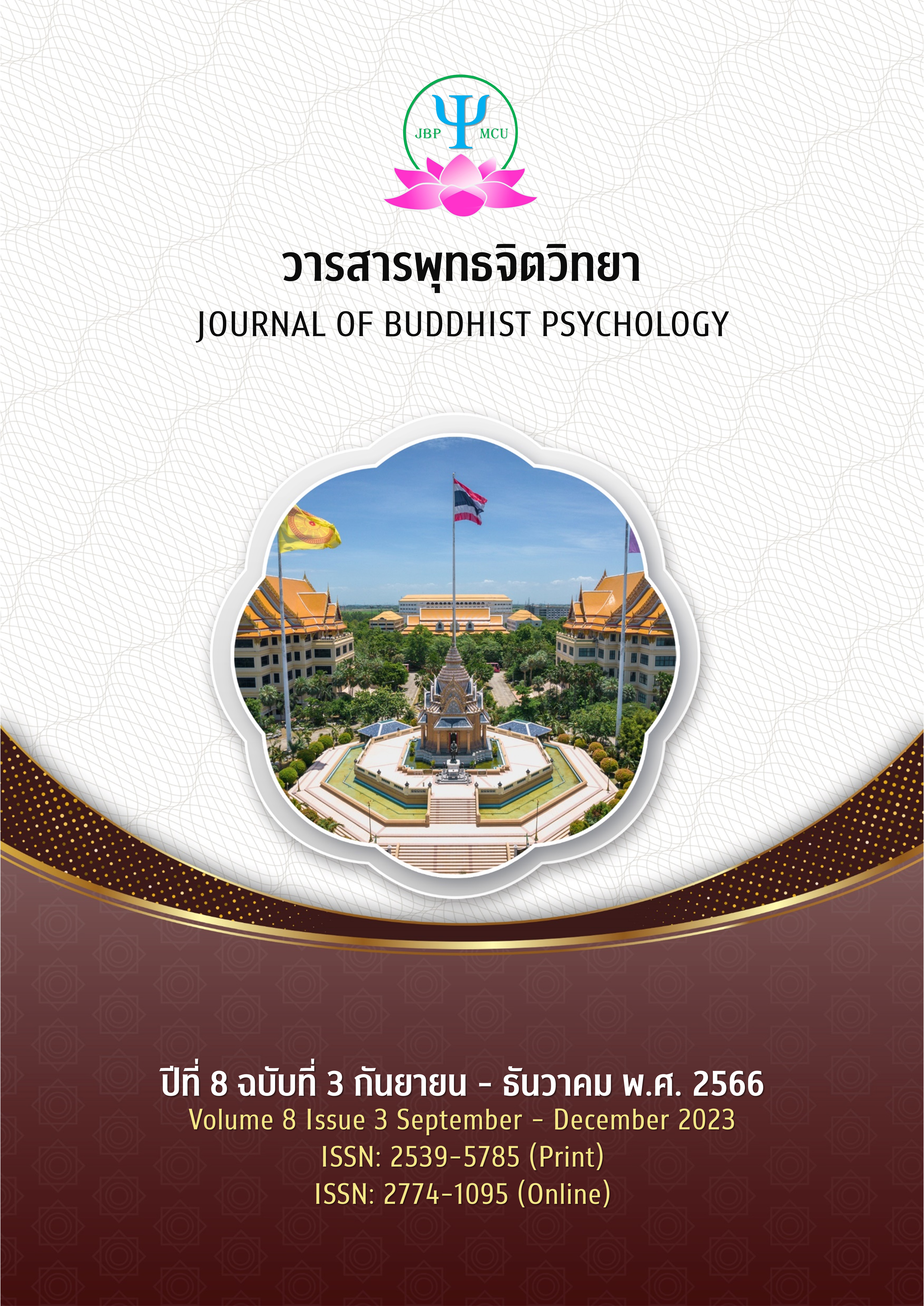ผลของโปรแกรมการเสริมสร้างความรอบรู้ด้านสุขภาพจิตแบบออนไลน์ต่อภาวะซึมเศร้า ในนักเรียนมัธยมศึกษาตอนปลาย
Main Article Content
บทคัดย่อ
การวิจัยกึ่งทดลองในครั้งนี้ เป็นการศึกษาผลของการเสริมสร้างความรอบรู้ด้านสุขภาพจิตแบบออนไลน์ต่อภาวะซึมเศร้าในนักเรียนมัธยมศึกษาตอนปลาย กลุ่มตัวอย่างเป็นนักเรียนมัธยมศึกษาตอนปลายในจังหวัดนครสวรรค์ ภาคการศึกษาที่ 1 ปีการศึกษา 2565 คัดเลือกกลุ่มตัวอย่างตามเกณฑ์คัดเข้าจำนวน 60 คน ที่ ทั้งเพศหญิงและเพศชาย สุ่มนักเรียนเข้ากลุ่มทดลองและกลุ่มควบคุม กลุ่มละ 30 คน ด้วยวิธีการสุ่มอย่างง่าย (Simple Random Sampling) กลุ่มทดลองได้รับการเสริมสร้างความรอบรู้ด้านสุขภาพจิตแบบออนไลน์ ประกอบด้วย8 กิจกรรม ดำเนินกิจกรรม 1 ครั้ง/สัปดาห์ ครั้งละ 90 นาที รวมระยะเวลาทั้งสิ้น 8 สัปดาห์ ส่วนกลุ่มควบคุมจะได้รับการดูแลตามปกติ เครื่องมือที่ใช้ในการวิจัย คือ 1) การเสริมสร้างความรอบรู้ด้านสุขภาพจิตแบบออนไลน์
2) แบบสอบถามข้อมูลส่วนบุคคล 3) แบบประเมินภาวะซึมเศร้าในวัยรุ่น แปลเป็นภาษาไทยโดย อุมาพร ตรังสมบัติ (2540) โดยใช้สถิติเชิงพรรณนาและสถิติทดสอบค่าที (t-test) ซึ่งผลการวิจัยสามารถสรุปได้ดังนี้
1) ค่าเฉลี่ยคะแนนภาวะซึมเศร้าของกลุ่มทดลองหลังได้รับโปรแกรมการเสริมสร้างความรอบด้านสุขภาพจิตแบบออนไลน์ มีค่าเฉลี่ย (M = 36.50, SD = 5.53) ต่ำกว่าก่อนการทดลอง (M = 40.37, SD = 7.70) อย่างมีนัยสำคัญทางสถิติ (t = 2.04, p<.05)
2) ผลต่างของค่าเฉลี่ยคะแนนภาวะซึมเศร้าของนักเรียนมัธยมศึกษาตอนปลาย ระหว่างก่อนและหลังที่ได้รับโปรแกรมการเสริมสร้างความรอบด้านสุขภาพจิตแบบออนไลน์ ของกลุ่มทดลอง (1 = -3.87, SD = 10.41) กับกลุ่มควบคุม (2= 1.13, SD = 8.73) มีความแตกต่างกันอย่างมีนัยสำคัญทางสถิติ (t = -2.02, p < .05)
สรุปได้ว่า โปรแกรมการเสริมสร้างความรอบด้านสุขภาพจิตแบบออนไลน์มีประสิทธิผลทำให้ภาวะซึมเศร้าของนักเรียนมัธยมศึกษาตอนปลาย ลดลงได้มากกว่าการได้รับการดูแลตามปกติ
Article Details

อนุญาตภายใต้เงื่อนไข Creative Commons Attribution-NonCommercial-NoDerivatives 4.0 International License.
เอกสารอ้างอิง
กระทรวงสาธารณสุข. (2559). องค์ความรู้การดำเนินงานดูแลสุขภาพวัยรุ่นแบบบูรณาการสำหรับทีมนักจัดการสุขภาพวัยรุ่น (Teen manager). กรุงเทพฯ: สำนักส่งเสริมและพัฒนาสุขภาพจิต กรมสุขภาพจิต กระทรวงสาธารณสุข.
ณิชาภัทร มณีพันธ์, สุวนีย์ เกี่ยวกิ่งแก้ว, เพ็ญพักตร์ อุทิศ. (2016). ผลของโปรแกรมสุขภาพจิตศึกษาแบบกลุ่มต่อภาวะซึมเศร้าของนักศึกษาพยาบาล. วารสารการพยาบาลจิตเวชและสุขภาพจิต, 30(3), 80–91.
ทัชชา สุริโย, อมราพร สุรการ, อัจศรา ประเสริฐสิน. (2559). การพัฒนาโปรแกรมการให้คำปรึกษากลุ่มเพื่อเสริมสร้างความฉลาดทางสังคมสำหรับวัยรุ่นกลุ่มเสี่ยงต่อภาวะซึมเศร้า. Veridian E-Journal, Silpakorn University, 9(1), 582–597.
ธนพล บรรดาศักดิ์, และคณะ. (2563). ผลของโปรแกรมการเสริมสร้างการปรับตัวต่อภาวะซึมเศร้าของนักศึกษาพยาบาล. วารสารพยาบาลทหารบก, 21(2), 443–452.
นุสรา นามเดช, พเยาว์ พงษ์ศักดิ์ชาต, อรทัย สงวนพรรค, (2561). Mental health literacy among senior high school students in Saraburi province. Journal of Nursing and Education, 11(3), 125–138.
รัตนา มาฆะสวัสดิ์. (2561). ปัจจัยที่มีอิทธิพลต่อภาวะซึมเศร้าของนักเรียนมัธยมศึกษาตอนปลายในจังหวัดปทุมธานี. วารสารศูนย์อนามัยที่ 9, 15(38), 528–540.
ฤทัยรัตน์ ชิดมงคล, รัตติกร เหมือนนาดอน, สุมัทณา แก้วมา, วีระพงษ์ เรียบพร. (2563). ภาวะซึมเศร้า และความรอบรู้ด้านสุขภาพจิตของวัยรุ่น. วารสารการพยาบาลการสาธารณสุขและการศึกษา, 21(2), 40–47.
วัลลภา กิตติมาสกุล. (2560). ผลของโปรแกรมการบำบัดความคิดและพฤติกรรมต่ออาการซึมเศร้าของวัยรุ่นที่ถูกทารุณกรรม (วิทยานิพนธ์ปริญญามหาบัณฑิต). มหาวิทยาลัยธรรมศาสตร์.
วิมลวรรณ, ปัญญาว่อง. (2563). ความชุกของภาวะซึมเศร้าและความเสี่ยงฆ่าตัวตายในวัยรุ่นไทย: การสำรวจโรงเรียนใน 13 เขตสุขภาพ. Journal of Mental Health of Thailand, 28(2), 136–149.
ศูนย์สุขภาพจิตที่ 3. (2564). Annual report 2020 mental health center region 3. AIMS Allergy and Immunology, 5(1), 33–37.
ศูนย์สุขภาพจิตที่3. (2564). รายงานผลการดำเนินงาน ศูนย์สุขภาพจิตที่ 3 ประจำปีงบประมาณ 2563. In aims allergy and immunology, 5(1), 54-64.
สถาบันสุขภาพจิตเด็กและวัยรุ่นราชนครินทร์. (2561). แนวทางการดูแลวัยรุ่นที่มีภาวะซึมเศร้า Clinical practice guideline for adolescents with Depression. สืบค้นเมื่อ 10 มกราคม 2566, จากhttps://dmhelibrary.org/items/show/313
Akhtarul Islam, M., Barna, S. D., Raihan, H., Nafiul Alam Khan, M., & Tanvir Hossain, M. (2020). Depression and anxiety among university students during the COVID-19 pandemic in Bangladesh: A web-based cross-sectional survey. PLoS ONE, 15(8 August), 1–13.
Bjornsen, H. N., Espnes, G. A., Eilertsen, M. E. B., Ringdal, R., & Moksnes, U. K. (2019). The relationship between positive mental health literacy and mental well-being among adolescents: implications for school health services. Journal of School Nursing, 35(2), 107–116.
Chang-Quan, H., Xue-Mei, Z., Bi-Rong, D., Zhen-Chan, L., Ji-Rong, Y., & Qing-Xiu, L. (2009). Health status and risk for depression among the elderly: A meta-analysis of published literature. Age and Ageing, 39(1), 23–30.
Cuoco, S., Cappiello, A., Abate, F., Tepedino, M. F., Erro, R., Volpe, G., Pellecchia, M. T., Barone, P., & Picillo, M. (2021). Psychometric properties of the Beck Depression Inventory-II in progressive supranuclear palsy. Brain and Behavior, 11(10), 1–9.
Dias, P., Campos, L., Almeida, H., & Palha, F. (2018). Mental health literacy in young adults: Adaptation and psychometric properties of the mental health literacy questionnaire. International Journal of Environmental Research and Public Health, 15(7). https://doi.org/10.3390/ijerph15071318
Duan, L., Shao, X., Wang, Y., Huang, Y., Miao, J., Yang, X., & Zhu, G. (2020). An investigation of mental health status of children and adolescents in china during the outbreak of COVID-19. Journal of Affective Disorders, 275(July), 112–118.
Jorm, A. F. (2011). Mental health literacy: Public knowledge and beliefs about mental disorders in mainland China. Brit Shjounal Brit Ishjournal of Psychiatry, 3(2), 369–401.
Jorm, A. F. (2012). Mental health literacy: Empowering the community to take action for better mental health. American Psychologist, 67(3), 231–243.
Kayani, S., Wang, J., Kayani, S., Kiyani, T., Qiao, Z., Zou, X., & Imran, M. (2021). Self-system mediates the effect of physical activity on students’ anxiety: a study from canada. Asia-Pacific Education Researcher, 30(5), 443–457.
Lam, L. T. (2014). Mental health literacy and mental health status in adolescents: a population-based survey. Child and Adolescent Psychiatry and Mental Health, 8(1), 26.
Lazaratou, H., Dikeos, D. G., Anagnostopoulos, D. C., & Soldatos, C. R. (2010). Depressive symptomatology in high school students: The role of age, gender and academic pressure. Community Mental Health Journal, 46(3), 289–295.
Lindow, J. C., Hughes, J. L., South, C., Minhajuddin, A., Gutierrez, L., Bannister, E., Trivedi, M. H., & Byerly, M. J. (2020). The youth aware of mental health intervention: impact on help seeking, mental health knowledge, and stigma in U.S. adolescents. Journal of Adolescent Health. https://doi.org/10.1016/j.jadohealth.2020.01.006
Mejías, J. A., Jurado, M. M., Tafoya, S. A., Romo, F., Sandoval, J. R., & Beltrán-Hernández, L. (2020). Effects of group psychotherapy on depressive and anxious symptoms, self-esteem and social adaptation in college students. Counselling and Psychotherapy Research, 20(1), 46–56.
Parhiala, P., Ranta, K., Gergov, V., Kontunen, J., Law, R., La Greca, A. M., Torppa, M., & Marttunen, M. (2020). Interpersonal counseling in the treatment of adolescent depression: A randomized controlled effectiveness and feasibility study in school health and welfare services. School mental health, 12(2), 265–283.
Rueger, S. Y., & George, R. (2017). Indirect effects of attributional style for positive events on depressive symptoms through self-Esteem during early adolescence. Journal of Youth and Adolescence, 46(4), 701–708.
Seedaket, S., Turnbull, N., Phajan, T., & Wanchai, A. (2020). Improving mental health literacy in adolescents: systematic review of supporting intervention studies. Tropical Medicine and International Health, 25(9), 1055–1064.
Steptoe, A., Tsuda, A., Tanaka, Y., & Wardle, J. (2007). Depressive symptoms, socio-economic background, sense of control, and cultural factors in university students from 23 countries. International Journal of Behavioral Medicine, 14(2), 97–107.
Vuthiarpa, S., Sethabouppha, H., Soivong, P., & Williams, R. (2012). Effectiveness of a school-based cognitive behavioral therapy program for thai adolescents with depressive symptoms. Pacific Rim International Journal of Nursing Research, 16(3), 206–221.
Wei, Y., Hayden, J. A., Kutcher, S., Zygmunt, A., & McGrath, P. (2013). The effectiveness of school mental health literacy programs to address knowledge, attitudes and help seeking among youth. Early Intervention in Psychiatry, 7(2), 109–121.
Would Health Oranization. (2018). Orientation programme on adolescent health-care providers: Handdout for module an introduction (p. 6). Retrieved January 10, 2023, fromwww.who.int/iris/bitstream/handle/10665/42868/9241591269_Handout_eng.pdf
Yıldız, M., Orak, U., Walker, M. H., & Solakoglu, O. (2019). Suicide contagion, gender, and suicide attempts among adolescents. Death Studies, 43(6), 365–371.


